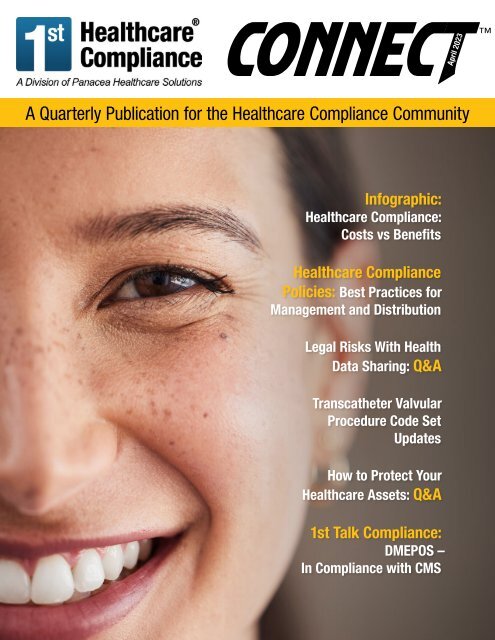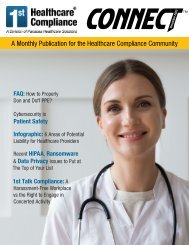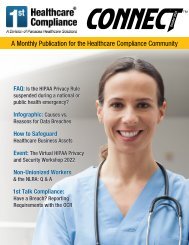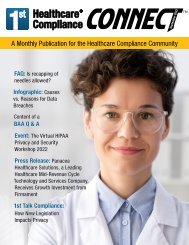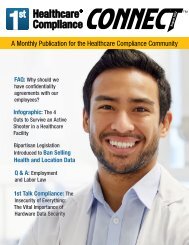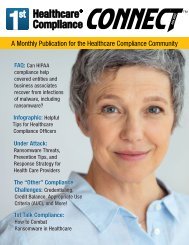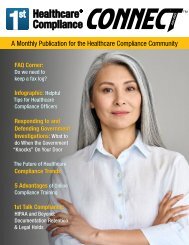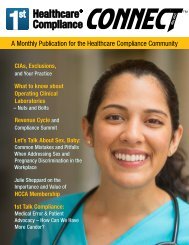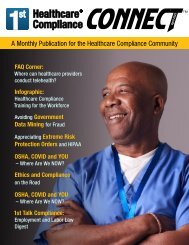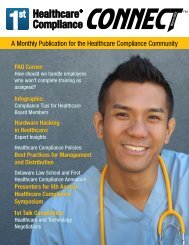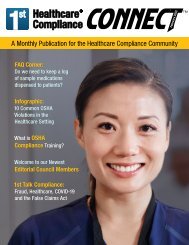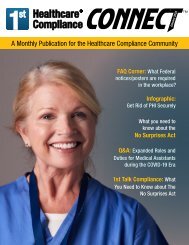First Healthcare Compliance CONNECT April 2023
You also want an ePaper? Increase the reach of your titles
YUMPU automatically turns print PDFs into web optimized ePapers that Google loves.
<strong>CONNECT</strong><br />
<strong>April</strong> <strong>2023</strong><br />
<br />
A Quarterly Publication for the <strong>Healthcare</strong> <strong>Compliance</strong> Community<br />
Infographic:<br />
<strong>Healthcare</strong> <strong>Compliance</strong>:<br />
Costs vs Benefits<br />
<strong>Healthcare</strong> <strong>Compliance</strong><br />
Policies: Best Practices for<br />
Management and Distribution<br />
Legal Risks With Health<br />
Data Sharing: Q&A<br />
Transcatheter Valvular<br />
Procedure Code Set<br />
Updates<br />
How to Protect Your<br />
<strong>Healthcare</strong> Assets: Q&A<br />
1st Talk <strong>Compliance</strong>:<br />
DMEPOS –<br />
In <strong>Compliance</strong> with CMS
Got a Minute? Please Rate Us!<br />
The health of our company depends on the members<br />
of our community spreading the word about us.<br />
Share Your Success Story<br />
An endorsement by you is the greatest compliment<br />
we could receive! Please take a moment of your time<br />
to rate us online so that others can benefit from your<br />
experience. It’s a simple way to help us grow and<br />
improve.<br />
We appreciate your support and look forward to<br />
hearing from you!<br />
In This Issue:<br />
Infographic: <strong>Healthcare</strong> <strong>Compliance</strong>: Costs vs<br />
Benefits<br />
<strong>Healthcare</strong> <strong>Compliance</strong> Policies: Best Practices<br />
for Management and Distribution<br />
Legal Risks With Health Data Sharing: Q&A<br />
Transcatheter Valvular Procedure Code Set<br />
Updates<br />
2<br />
Panacea <strong>Healthcare</strong> Solutions LLC © <strong>2023</strong>
<strong>Compliance</strong> Super Ninja <br />
Mia Higgins<br />
Director, Client Services, McEwen and Associates<br />
How would you describe your experience with <strong>First</strong> <strong>Healthcare</strong><br />
<strong>Compliance</strong>?<br />
Terrific! It has made my work life so much easier. <strong>First</strong> <strong>Healthcare</strong> <strong>Compliance</strong> has<br />
everything you need in one space. It would take me hours at times to search for answers but with their free<br />
resources you find everything you need with ease!<br />
What do you enjoy most about working with McEwen and Associates?<br />
The people. My team is so important to me, we are a family. I enjoy watching my team grow and building longlasting<br />
relationships with our clients.<br />
Would you rather be completely invisible for one day or be able to fly for one day?<br />
Why?<br />
I’d rather be completely invisible for one day. I love Halloween and being invisible would allow me to scare my<br />
family and pull a few pranks on them. I get motion sickness so flying would be out of the question!<br />
How to Protect Your <strong>Healthcare</strong> Assets: Q&A<br />
1st Talk <strong>Compliance</strong>: DMEPOS – In <strong>Compliance</strong><br />
with CMS<br />
Contact Toll Free: 888-54-FIRST 3
FAQ Corner<br />
How should we handle employees who won’t complete training as assigned?<br />
<strong>Compliance</strong> should be a condition of employment. And as part of the Code of Conduct sample we provide,<br />
employees are required to complete compliance training. Employers may wish to enforce their training<br />
requirements through discipline. Discipline may include a verbal warning, written warning, suspension, up to and<br />
including termination. Of course, if your organization has a progressive discipline policy, it must be followed when<br />
disciplining employees (we provide a sample compliance program disciplinary action policy within the <strong>Compliance</strong><br />
Policies and Procedures Sample). It is also important to be consistent in meting out discipline so as not to run<br />
afoul of discrimination laws.<br />
Explore the FAQs tab in your compliance solution<br />
to find answers to your compliance questions!<br />
CLIENT<br />
ALERT<br />
Navigating Workplace Violence<br />
Prevention Under OSHA<br />
Workplace violence is a serious issue, especially<br />
in healthcare facilities. The OSHA workplace<br />
violence prevention guidelines help employees and<br />
employers alike by providing the necessary steps<br />
to maintain a safe work environment.<br />
DOWNLOAD NOW<br />
4<br />
Panacea <strong>Healthcare</strong> Solutions LLC © <strong>2023</strong>
<strong>Healthcare</strong> <strong>Compliance</strong>:<br />
Costs vs Benefits<br />
Within the healthcare industry, the focus has increasingly turned toward compliance, and<br />
there are multiple regulations that prompt the need for implementation of an effective program.<br />
COSTS of Being Reactive<br />
BENEFITS of Being Proactive<br />
It's the law, so criminal<br />
charges come into play.<br />
Enforcement has been<br />
increased over the last<br />
several years.<br />
Reputation matters more<br />
than ever. News travels fast<br />
and a physician's reputation<br />
has a direct impact on the<br />
success of the practice.<br />
Patient outcomes<br />
may be affected by<br />
lack of safety.<br />
Staff confidence and<br />
morale will benefit from<br />
extra training and knowledge.<br />
"Knowledge is power" is<br />
especially applicable in<br />
any medical setting.<br />
Showing that you've<br />
commited time and<br />
resources to compliance<br />
shows the community and<br />
your staff that you believe<br />
in doing things the right way.<br />
The impact may be<br />
monetary via fines<br />
and penalties.<br />
Having a full compliance<br />
program in place leads<br />
to better communication<br />
and uncovering potential<br />
problems.<br />
Comprehensive <strong>Healthcare</strong><br />
<strong>Compliance</strong> Management Solutions<br />
CONFIDENCE INCLUDED<br />
Creating confidence among<br />
compliance professionals through<br />
education, resources, and support<br />
Contact Toll Free: 888-54-FIRST 5
<strong>Healthcare</strong> <strong>Compliance</strong><br />
Policies: Best Practices for<br />
Management and Distribution<br />
<strong>First</strong> <strong>Healthcare</strong> <strong>Compliance</strong> Staff<br />
Purposes of Policies in <strong>Healthcare</strong> Organizations<br />
Many healthcare organizations operate under a comprehensive set of policies and procedures that address<br />
a wide range of compliance-related issues, including physician relationships, conflicts of interest, OSHA and<br />
HIPAA Privacy and Security. These policies and procedures should be available to every employee and provider.<br />
Specific standards set by an entity as well as the elements of an effective compliance program provided by OIG/<br />
HHS offer frameworks for roles and committees to ensure consistency and integration of compliance activities<br />
and the effectiveness of the overall compliance program.<br />
A well-managed set of policies is critical to the well-being of any healthcare institution. Proper policies support<br />
activities by communicating expectations, establishing a culture of compliance, protecting in litigation matters,<br />
and ensuring the welfare of patients and staff.<br />
Important purposes of policies in the healthcare setting include:<br />
1. Provide the framework for the key elements of the compliance program<br />
2. Promote and support ethical behavior among staff<br />
3. Exhibit commitment to compliance and all regulations governing the organization<br />
Management and Distribution of <strong>Healthcare</strong> <strong>Compliance</strong> Policies<br />
In addition to creating, communicating, and maintaining policies within a healthcare organization, it is imperative<br />
to take steps to manage and distribute the policies effectively.<br />
Assign Responsibility<br />
An individual should be responsible for managing policies within the healthcare organization. Depending on<br />
6<br />
Panacea <strong>Healthcare</strong> Solutions LLC © <strong>2023</strong>
the size of the entity, it may be either a full or part time position.<br />
Control Access<br />
For the purposes of efficiency and privacy and security, the administrator should have full control when it<br />
comes to providing access for reading and editing policies.<br />
Track Policy Updates<br />
Tracking policy changes becomes a necessity to provide accurate information to compliance questions or<br />
auditors.<br />
<strong>First</strong> <strong>Healthcare</strong> <strong>Compliance</strong> offers several solutions that provide customizable sample Policies and Procedures.<br />
In addition, our Document Storage zone allows compliance personnel to upload, organize and distribute<br />
documents via the Training Zone for employee attestation. To learn more contact us today!<br />
The Most Comprehensive<br />
<strong>Healthcare</strong> <strong>Compliance</strong> Course<br />
The Fundamentals is a<br />
user-friendly, four-module<br />
online course designed to<br />
help healthcare professionals<br />
understand the essential<br />
principles and practices of<br />
compliance.<br />
BUY COURSE NOW<br />
Contact Toll Free: 888-54-FIRST 7
Legal Risks<br />
With Health<br />
Data Sharing:<br />
Q&A<br />
Catherine Short<br />
Iliana L. Peters, Shareholder at Polsinelli PC, believes<br />
good data privacy and security is fundamental to<br />
ensuring patients’ trust in the health care system, and to<br />
helping health care clients succeed in an ever-changing<br />
landscape of threats to data security. She is recognized<br />
by the health care industry as a preeminent thinker and<br />
speaker on data privacy and security, particularly with<br />
regard to HIPAA, the HITECH Act, the 21st Century Cures<br />
Act, the Genetic Information Nondiscrimination Act (GINA),<br />
the Privacy Act, and emerging cyber threats to health data.<br />
For many years, Iliana both developed health information<br />
privacy and security policy, including on emerging<br />
technologies and cyber threats, for the Department<br />
of Health and Human Services, and enforced HIPAA<br />
regulations through spearheading multi-million dollar<br />
settlement agreements and civil money penalties pursuant<br />
to HIPAA. Iliana also focused on training individuals in<br />
both the private and public sector, including compliance<br />
investigators, auditors, and State Attorneys General, on<br />
HIPAA regulations and policy, and on good data privacy<br />
and security practices.<br />
As a member of the <strong>First</strong> <strong>Healthcare</strong> <strong>Compliance</strong> Editorial<br />
Council, Iliana is a frequent presenter at educational<br />
events. For more information regarding this topic please<br />
view the related webinar for further discussion and<br />
learning.<br />
Below, Iliana answers some common questions<br />
and provides explanations related to the education<br />
surrounding Health Data, A Value Proposition: Legal Risks<br />
with Innovative Data Sharing Projects.<br />
Can you give us an overview of the health data value<br />
proposition, what some of the legal risks are with<br />
data sharing projects?<br />
This is a new and evolving area of practice, particularly<br />
because we have many different entities that are very<br />
interested in engaging in innovative data sharing projects<br />
that result from the need to do research of all different<br />
types. This includes research with a small “r,” in terms<br />
of research and development within entities, and the of<br />
development of new products and services. And this also<br />
includes Research with a big “R,” that is human subjects<br />
research, as defined under the law, that may be used to<br />
determine new therapies, new drugs, new devices for<br />
patients, as well. There are all kinds of research projects<br />
going on related to the use of data, and for many different<br />
important reasons. And as a result, we’re seeing a lot<br />
of questions about the legal requirements and risks<br />
associated with those types of projects, and particularly<br />
the agreements that are necessary and being put in place<br />
between business partners related to those projects.<br />
Can you give us a summary of the legal issues<br />
involved in data sharing projects and do you think<br />
there are serious legal risks associated with some of<br />
these issues and projects?<br />
8<br />
Panacea <strong>Healthcare</strong> Solutions LLC © <strong>2023</strong>
The short answer is, yes, there is serious legal risk. There<br />
are state, federal or international legal requirements<br />
related to how we can use and disclose data. That<br />
includes a general prohibition on the sale of data. Many<br />
of these innovative projects include some kind of benefit<br />
to the entity originating the data, because the entity is, in<br />
fact, contributing data to an important project that’s going<br />
to arguably result in a new service or a new application.<br />
As a result, these agreements contemplate direct or<br />
indirect remuneration, that is, some kind of benefit to<br />
the entity that’s originating the data. This is considered<br />
a sale of data. That would necessitate consent from the<br />
individuals whose data is being using for these projects.<br />
It is important that entities understand what this looks<br />
like, from a legal perspective, because of those risks. As<br />
a result, a lot of entities are anonymizing data so that we<br />
can use data for projects involving remuneration without<br />
implications for patient privacy, because the patients are<br />
arguably not identifiable, or we don’t know who those<br />
patients are as part of those projects, because we’ve<br />
anonymized the data.<br />
Obviously, if we’re going to do that, we have to make sure<br />
that we do that properly, in a way that doesn’t allow for<br />
those individuals to be identified, doesn’t allow business<br />
partners or downstream users of that data, to re-identify<br />
or recombine data with other data sets to figure out who<br />
those people are. This is not easy; it’s a difficult issue.<br />
Additionally, we have contractual requirements with our<br />
own clients and business partners that may significantly<br />
restrict how we can use data, how we can put data<br />
together and datasets, and how we can anonymize the<br />
data. For example, Centers for Medicare and Medicaid<br />
Services have significant prohibitions in agreements<br />
related to Medicare and Medicaid beneficiary data that we<br />
have to be aware of when we’re aggregating data or deidentifying<br />
it. We generally can’t use CMS data in that way.<br />
That’s just one example from a contractual perspective.<br />
And then, of course, we have data breach issues. Anytime<br />
we’re putting together lots of data into a big data set, that<br />
becomes a target for a cyber-criminal or threat actor. We<br />
have to be very cognizant of the risks there, particularly<br />
if we’re providing that data outside our entity, to another<br />
Risk Management Considerations for the<br />
<strong>Healthcare</strong> <strong>Compliance</strong> Officer:<br />
Training, Incident Management,<br />
Governing Boards, and Measures Unique<br />
to COVID-19<br />
It’s no secret that healthcare is one of America’s<br />
most heavily regulated industries with substantial<br />
fines and penalties for non-compliance. Complex<br />
regulations and mandates make compliance<br />
management a necessity.<br />
DOWNLOAD NOW<br />
Contact Toll Free: 888-54-FIRST 9
usiness partner, who’s then going to have our data and<br />
be subject to those risks.<br />
Finally, there’s always a reputational issue, even if we do<br />
everything in a legal way. Even if we protect the data from<br />
a data security perspective, individuals could still find out<br />
about how we’re using their data, because maybe it’s not<br />
identifiable, maybe it’s anonymized data, but it still came<br />
from them originally. And they can feel very strongly about<br />
how we’re proposing to use data for a particular project.<br />
Maybe they don’t agree with a particular project, for<br />
whatever reason. That could also create reputational risks<br />
for us.<br />
These are all these risks that we have to consider, from<br />
an underlying legal perspective, a contractual perspective,<br />
about data ownership, and about data licensure; all of<br />
those important controls that we put in place for data<br />
security purposes. Then just considering what the<br />
consumer would feel about a particular data project to<br />
make sure that we consider their viewpoints on these<br />
projects as well.<br />
What are the most important risks to consider in<br />
innovative data sharing projects?<br />
I think the most important risks are the risks associated<br />
with how the business partners that you’re working<br />
with are going to use your data. At the end of the day,<br />
making sure that we understand the data ownership and<br />
licensure issues, particularly with regard to the type of<br />
data that we’re using for any particular project is critical,<br />
so that we can ensure the right controls for that data. We<br />
want to make sure that we appropriately take care of that<br />
data. Arguably, we can control how we use our own data.<br />
It’s really about when we share that data with business<br />
partners, how we do our best to make clear to those<br />
business partners how we expect them to use and share<br />
our data and how we expect them to protect it. It’s about<br />
making sure they understand our ownership of the data,<br />
what the license to the data looks like, for purposes of a<br />
particular project, and how they’re going to protect the<br />
data, as they hold it. I would say that’s the largest risk,<br />
when we share that data outside of our own institutions.<br />
COVID-19 <strong>Healthcare</strong><br />
<strong>Compliance</strong> Updates<br />
In response to the global outbreak of the novel<br />
coronavirus disease (COVID-19), the Secretary<br />
of Health and Human Services declared a public<br />
health emergency on January 31, 2020. Federal<br />
agencies have taken action by issuing updates and<br />
guidance to navigate the crisis. This ebook provides<br />
healthcare providers with important developments<br />
and resources that impact federal healthcare laws.<br />
DOWNLOAD NOW<br />
10<br />
Panacea <strong>Healthcare</strong> Solutions LLC © <strong>2023</strong>
Have you heard<br />
our big news?<br />
<strong>First</strong> <strong>Healthcare</strong> <strong>Compliance</strong> is now part of<br />
the Panacea <strong>Healthcare</strong> Solutions family!<br />
At <strong>First</strong> <strong>Healthcare</strong> <strong>Compliance</strong>, our<br />
mission has always been to provide<br />
healthcare entities with the tools and<br />
resources they need to ensure compliance<br />
with regulations and industry standards.<br />
Now, as part of the Panacea <strong>Healthcare</strong><br />
Solutions family, we're taking this mission<br />
to the next level.<br />
Panacea's state-of-the-art strategic pricing<br />
and auditing solutions are now combined<br />
with <strong>First</strong> <strong>Healthcare</strong> <strong>Compliance</strong> to offer<br />
the best-in-class solutions. This<br />
collaboration brings together the expertise<br />
of two leading companies to deliver<br />
unparalleled solutions that meet the<br />
unique needs of healthcare organizations<br />
nationwide.<br />
With Panacea's cutting-edge mid-revenue<br />
cycle software and technology-enabled<br />
solutions, we offer a comprehensive suite of<br />
compliance services that streamline your<br />
workflows and enhance your bottom line.<br />
Our team of experts is committed to<br />
delivering personalized support and<br />
guidance to help you navigate the complex<br />
landscape of healthcare compliance.<br />
Join the many healthcare organizations<br />
already benefiting from our innovative<br />
solutions.<br />
Contact us today to learn more about how<br />
our combined expertise can help you<br />
achieve your compliance and revenue goals.<br />
panaceainc.com | (866) 926-5933 | contact@panaceainc.com<br />
Software. Consulting. Education. Results.<br />
Contact Toll Free: 888-54-FIRST 11
Transcatheter<br />
Valvular Procedure<br />
Code Set Updates<br />
New Technologies and the<br />
Codes You Should Capture<br />
Catherine Short<br />
Over the last decade, one of the most exciting areas<br />
of development in healthcare has been the growth<br />
of structural heart and interventional cardiology<br />
programs—specifically, the advancement of<br />
transcatheter valvular procedure techniques.<br />
There has been significant scientific advancement<br />
in these techniques since the transcatheter valvular<br />
procedure code set was initially developed, including<br />
the establishment of clinical trials testing new<br />
treatment methods and devices. The complex<br />
nature of these treatment programs and the rapid<br />
advancements in treatments and technology have led<br />
to the development of some very complicated coding<br />
rules and coverage requirements from CMS and other<br />
payers.<br />
As the ability to treat a larger population using<br />
these novel techniques expands, so must<br />
our understanding of the nuances involved in<br />
navigating the current rules and regulations from<br />
both the clinical and revenue cycle perspectives.<br />
In case you missed our webinar on the subject, you<br />
can review the material covered during the live session<br />
by referencing an eBook of the presentation content.<br />
Read through for an overview of the following topics:<br />
• How transcatheter techniques are reshaping<br />
treatment options<br />
• Cardiac anatomy<br />
• Transcatheter valve procedures and clinical trials/<br />
data registry requirements<br />
• Successful clinical trial information capture<br />
• Sample claims<br />
• CPT code set<br />
• Key resources<br />
READ MORE<br />
12<br />
Panacea <strong>Healthcare</strong> Solutions LLC © <strong>2023</strong>
Referral Appreciation Program<br />
Receive a $50 gift card* when you refer a client!<br />
<strong>First</strong> <strong>Healthcare</strong> <strong>Compliance</strong> is delighted to offer a<br />
Referral Appreciation Program to say thank you for<br />
helping us to continue to grow. For each new 1st<br />
Professional or 1st Premium client originating from a<br />
referral, <strong>First</strong> <strong>Healthcare</strong> <strong>Compliance</strong> will provide a<br />
$50 gift card as a token of appreciation.<br />
LEARN MORE<br />
Contact Toll Free: 888-54-FIRST 13
How to Protect<br />
Your <strong>Healthcare</strong><br />
Assets: Q&A<br />
Catherine Short<br />
Highly-regarded attorneys Sean McKenna, Lauren<br />
Nelson, and Vincent Aiello of Spencer Fane LLP<br />
recently held the comprehensive webinar Preserving<br />
and Protecting Assets in <strong>Healthcare</strong> joined by Catherine<br />
Short and <strong>First</strong> <strong>Healthcare</strong> <strong>Compliance</strong>. Please see their<br />
bios at the end of this page.<br />
Continue reading for Sean, Lauren, and Vince’s lively<br />
question and answer session related to enforcement<br />
and liability proceedings with asset protection, and<br />
explore government and private litigation matters.<br />
What do you need to do in order to protect<br />
yourself from government investigations?<br />
Lauren:<br />
The government has really ramped up their civil and<br />
criminal investigations over the last year or two. And<br />
they have new initiatives that are really focused on<br />
recovering money spent on these alleged fraudulent<br />
claims. In the last year, they’ve really been focusing<br />
on telehealth claims submitted by labs, as well as<br />
pharmacies. And they’ve started the investigations into<br />
COVID funding and billing, as well as your PBMs. We<br />
expect the government will continue to ramp up the<br />
investigations in these areas as well as other potential<br />
areas. In addition, the different licensing boards<br />
have also resumed their unannounced surveys and<br />
inspections of provider sites.<br />
To help protect yourself from investigations, the first<br />
thing is to have a full understanding of what these<br />
different potential risks are. To do this, you need to do<br />
a comprehensive and very strategic assessment of all<br />
potential risks throughout your organization. Frequently<br />
people talk about enterprise risk management. It really<br />
is a great approach because it looks at every different<br />
department of a health care system. And it’s important<br />
that not only do you do these risk assessments in<br />
each department, but you need to have the different<br />
groups communicate and work together. So, there’s<br />
coordination and a real appreciation for what those<br />
risks are.<br />
Lauren, can you speak to the risk factors<br />
or components of a smaller organization<br />
versus those of a large institution or national<br />
company?<br />
Lauren:<br />
Yes, absolutely. It’s really about understanding what<br />
those potential risks are. If you can coordinate the<br />
efforts of these assessments, with the different<br />
departments you’re in, you will end up putting less<br />
strain and demand on the individual departments. And<br />
that results in a better understanding of the potential<br />
risks. It also gives you the capability of improving<br />
those potential problems that you can identify. One<br />
14<br />
Panacea <strong>Healthcare</strong> Solutions LLC © <strong>2023</strong>
ig area, as a defense attorney, I frequently deal with<br />
are patient medical records, and I always deal with<br />
risk management. What can be a little problematic<br />
is when there’s a lack of coordination between the<br />
IT department or the records department, and risk<br />
management. So, it’s important that everyone’s on the<br />
same page, and has a good understanding of what<br />
information is available.<br />
What are common compliance issues you see<br />
in your practice, Lauren?<br />
Lauren:<br />
So, common compliance issues that we see… and<br />
I’m not going to list out every single one of these, but,<br />
common problems are issues with inappropriately<br />
providing copay assistance, not adhering to a contract,<br />
having a commercially unreasonable arrangement,<br />
retroactive payments or adjustments and things like<br />
that.<br />
Sean, I’m sure you see a lot of this in your<br />
practice, right?<br />
Sean:<br />
Yes, absolutely. One of the biggest concerns from a<br />
compliance perspective that translates into potential<br />
monetary damages are these per click percentagebased<br />
arrangements. Those have been frowned on,<br />
they’ve been deemed non-compliant by Department of<br />
Justice and OIG in various states. We’re seeing a lot of<br />
those cases. Also, joint ventures. Those will continue<br />
to be at risk, the OIG has said. For decades, these<br />
are all Hot Topic issues along with those sectors that<br />
are being scrutinized that could result in some sort of<br />
monetary penalty or financial hit, not just monetary,<br />
but could be institutional, goodwill, morale, etc., all<br />
could have an impact on providers’ bottom line and<br />
could result in some sort of default, or some sort of<br />
other potentially private liability on the quality side.<br />
Vince, can you discuss enforcement and<br />
potential liability, especially during the<br />
pandemic and onwards? What can you talk<br />
to us about kind of what individuals and<br />
executives and company’s clinicians can do to<br />
protect and preserve their assets?<br />
Absolutely. Before we get going into asset protection<br />
trusts, and some asset protection strategies, there’s<br />
a few caveats: one, asset protection, asset protection<br />
strategies work best when planning ahead. If you’re<br />
thinking that you’re going to set up an asset protection<br />
trust, at the last minute, after a claim has been filed,<br />
after an investigation has started, that’s generally a<br />
huge red flag.<br />
If you’re not setting these trusts up at least a minimum<br />
of two years before any potential claim, then there’s a<br />
risk that they may not work. Also, these types of trusts<br />
aren’t a panacea to simply skirt liability and somehow<br />
say that you can engage in nefarious conduct or things<br />
that are criminal in nature. They don’t function in that<br />
capacity. With those sort of basic caveats in mind, I<br />
can kind of walk through the process of setting up<br />
an asset protection trust and what it is and what’s<br />
involved with that. Asset protection trusts have been<br />
around for quite some time, in their simplest way to<br />
think about them, they are a contract, there is a trust<br />
agreement, and they are a creature of statute, they are<br />
almost always an irrevocable trust. They are set up<br />
under the laws of particular states. Legislatures have<br />
expanded the scope of protections in various states<br />
and offer various degrees of creditor protection for the<br />
individuals that are setting up an asset protection trust.<br />
An asset protection trust, essentially is a contract<br />
document. It allows you to preserve your assets, retain<br />
beneficial interests of those assets, and protect the<br />
assets from creditors. It’s highly effective if they’re<br />
set up ahead of time for entrepreneurs setting up all<br />
sorts of businesses, medical practices, medical service<br />
organizations, for business owners, for the individual<br />
employees that are functioning as directors or officers,<br />
CEOs, for doctors, and generally used for individuals<br />
with higher net worth. You’re not going to see an asset<br />
protection trust set up in a scenario where you are<br />
trying to preserve a few $100,000 in assets. Usually,<br />
these are going to be folks who have a few million<br />
dollars at risk and you’re setting it up to mitigate any<br />
potential risk of liability seizure and forfeiture that<br />
may come from all the things that Lauren and Sean<br />
discussed.<br />
Contact Toll Free: 888-54-FIRST 15
You mentioned potential red flags. What are<br />
the consequences when you see all these red<br />
flags? What can happen?<br />
Vince:<br />
Oftentimes, folks will come to me and they’ll say I<br />
want to set up an asset protection trust and I want to<br />
control everything. That’s a huge red flag. You’re going<br />
to have to be comfortable with moving your assets into<br />
an irrevocable asset protection trust, to preserve those<br />
assets for your benefit, but you can’t retain too much<br />
control over those assets. And this is sort of where<br />
Catherine nuances Short of state law and trust drafting come into<br />
play. And really, it goes to how these documents aren’t<br />
formulaic. They need to be set up for the individual<br />
business owner, the professional doctor or person that<br />
is potentially subject to the to the liability of running a<br />
medical organization, doctor’s office and whatnot.<br />
So, there are lookback periods, and the red flag that<br />
happens is that the doctor or business owner comes<br />
in and they say, “I think I’m under investigation, but<br />
I’m not sure.” And then, all of a sudden, they’ll say,<br />
“We need to take certain steps to protect my assets.<br />
I’ve never done that before, I have an LLC, but I’m<br />
concerned, I may have some liability.” If you race to set<br />
up an asset protection trust after the fact, both a civil<br />
attorney and a criminal prosecutor can file motions to<br />
have the judge look at the transfers into those trusts<br />
and set those transfers aside, essentially unwinding<br />
the value in the benefit the trust offers.<br />
So, for example, in Nevada, and several other states,<br />
the look back period is two years. If a client comes<br />
to me today, and they want to start a new medical<br />
practice group, and they’re concerned about potential<br />
liability, perhaps they’ve invested a million dollars into<br />
the business, and they don’t want to lose the balance<br />
of their investments and holdings, they will want to set<br />
up this trust. As long as they’re doing that two years<br />
before they incur any potential liability, then they’re fine.<br />
Sean, could you discuss on civil forfeiture<br />
because of your background and what you<br />
focus on in your practice?<br />
Sean:<br />
Civil forfeiture essentially means that we think there<br />
may be some sort of illegal, ill-gotten gains, and<br />
we’re going to take it until you claim it, and then have<br />
to justify how it’s not. And so now the burden shifts<br />
entirely on the individual whose funds have been<br />
seized. And this is a favorite of local law enforcement,<br />
as well as the feds, they can go in, along with a search<br />
warrant, or just on their own and seize a bank account,<br />
for instance. And then you must administratively make<br />
a claim and then litigate it as a mini trial and basically<br />
justify your existence. So, it’s extremely burdensome<br />
for an individual or business to try and justify and<br />
explain. It’s an exorbitant amount of time and effort<br />
to try and do a tracing or not tracing. Sometimes you<br />
can negotiate it and sometimes you can’t. But civil<br />
forfeiture is a very powerful tool for the Department<br />
of Justice (DOJ) and its agencies. You know, DEA, FBI,<br />
IRS, are the ones that typically use is the most.<br />
What’s ahead, Lauren, any predictions for the<br />
year?<br />
Lauren:<br />
Sure. So, there are predictions that due to patients<br />
delaying receiving care, over the last couple of years,<br />
because of the pandemic, health care providers are<br />
anticipating an increased need for care, especially in<br />
the long-term care sector as well as care for chronic<br />
diseases, as well as behavioral health. And one thing<br />
that will be interesting to watch over the rest of the<br />
year, is the further integration and diversification of<br />
how that care is being provided. So, through telehealth,<br />
the integration from wearable devices and things like<br />
that, which, those issues, raise cybersecurity questions.<br />
There’s also a thought that there will be a greater level<br />
of investigation by the government and there’ll be<br />
greater scrutiny for FCA and AKS.<br />
16<br />
Panacea <strong>Healthcare</strong> Solutions LLC © <strong>2023</strong>
Vince, do you have further thoughts on our<br />
topic?<br />
Vince:<br />
I think my final thought is to plan for the future. In my<br />
practice, that’s key. If you’re in business now, and you<br />
haven’t planned, and you’ve got a concern, if you think<br />
you’ve got exposure, still plan now. It’s not too late.<br />
Whatever the big scary liability is that that is out there,<br />
there are ways to deal with that. It’s very unfortunate<br />
when folks come to my office too late. There’s very<br />
little we can do after the fact. So, that that’s my<br />
suggestion.<br />
Sean McKenna, Lauren Nelson, and Vincent<br />
Aiello of Spencer Fane LLP<br />
With 24 years of experience,<br />
Sean McKenna is a nationallyrecognized<br />
defense attorney<br />
who focuses his practice<br />
on defending executives<br />
and providers in healthcare<br />
enforcement, litigation, and<br />
regulatory issues, under civil or administrative<br />
investigation by the U.S. DOJ, OIG, and Attorneys’<br />
General Medicaid Fraud Control Units, as well as in<br />
criminal investigations and matters involving federal<br />
and state governments. As a former ten-year Assistant<br />
United States Attorney, Associate Counsel to the<br />
Inspector General, and General Counsel for the U.S.<br />
Department of HHS, Sean also assists clients with<br />
internal investigations, compliance reviews, as well<br />
as advising on their compliance with state and federal<br />
fraud and abuse rules.<br />
Lauren M. Nelson has 16-years<br />
of experience litigating<br />
across the country on behalf<br />
of healthcare providers<br />
and executives, including<br />
hospital systems, physicians,<br />
rehabilitation centers and other<br />
providers in complex medical malpractice actions,<br />
licensing matters, and other business disputes. She<br />
specializes in a variety of cases, from catastrophic<br />
birth and spinal cord injuries to misdiagnoses and<br />
failures to treat. Lauren also counsels and represents<br />
physicians and nurses before State and federal<br />
regulators and licensing boards in all manner of<br />
investigations, reviews, and inquiries.<br />
Vincent Aiello helps business<br />
owners solve legal problems<br />
to secure revenue flow and<br />
reduce business risks. As a<br />
lawyer and business owner<br />
he has firsthand experience<br />
handling complex commercial<br />
litigation and transactional matters for his clients. His<br />
client base spans a broad spectrum of businesses<br />
including household-name consumer brands, banks,<br />
construction companies and family ventures. As legal<br />
counsel, he advises personal family foundations on<br />
managing and protecting their wealth. While each of<br />
his clients may take on a unique shape or size, they all<br />
face complex legal and business challenges, which is<br />
precisely where Vincent has focused his commercial<br />
legal practice.<br />
Contact Toll Free: 888-54-FIRST 17
hosted by Catherine Short<br />
1st Talk <strong>Compliance</strong> features guest Rachel V. Rose, JD, MBA, principal with Rachel V. Rose – Attorney at<br />
Law, P.L.L.C., on the topic of DMEPOS – In <strong>Compliance</strong> with CMS. Rachel joins our host Catherine Short<br />
to discuss special payment rules associated with durable medical equipment, prosthetics, orthotics and<br />
supplies. DMEPOS products must meet quality standards, suppliers need to be accepted by Medicare to<br />
participate, similar to providers, and are subject to fraud, waste, and abuse laws. This episode will provide<br />
an overview of participation and quality requirements, relay the latest compliance and requirements updates,<br />
and discuss the consequences of non-compliance, as well as submitting false and fraudulent claims.<br />
Listen weekdays at<br />
7:30am, 3:30pm, 11:30pm ET<br />
Check out our Show Page!<br />
Looking for the latest compliance insights?<br />
Subscribe to our feed and don’t miss a thing!<br />
18<br />
Panacea <strong>Healthcare</strong> Solutions LLC © <strong>2023</strong>
WORD SEARCH<br />
K H M P C F R L M M H E C F C H Q A R V<br />
G X P T V B I U V L D W Q J Q L S P S K<br />
Y T T R S W A S T E O K S Z W B A T N H<br />
F N U A T I D B S V J S G O S R E G O Q<br />
C E W N W K O O S E Y L F S E D R V I X<br />
E M G S O E E Q B O R N K S I B W Z T Y<br />
Z E J C S N Z F L N L U O X G M X Y A T<br />
Y G P A M I D L R M V U D D M K H C Z M<br />
H A D T D L Z E Y V R W T E Q L Y O I J<br />
B N S H U P M F C C C G N E C G J X N K<br />
Z A N E N I E W E R P W P K L O D M A Z<br />
A M O T E C I S D T I O T A C Y R Q G H<br />
L I I E S S F E H K L Q Q P S V V P R G<br />
B U T R U I W M I I Z U J Z L I O H O W<br />
L A C C B D W E C N A I L P M O C L H L<br />
L D I J A I D I Q L B R W Y S R G J F X<br />
R M D D I I E R I R O X L T L W X J T H<br />
M L E I N S D T E R A C H T L A E H E X<br />
P T R Z H X Y Q E C X Z S B F R A U D J<br />
X I P M X Z L X R O L C L D T K X W X U<br />
MANAGEMENT ORGANIZATIONS PROCEDURES<br />
COMPLIANCE QUALITY FRAUD<br />
WASTE ABUSE PREDICTIONS<br />
HEALTHCARE ABSOLUTELY TRANSCATHETER<br />
DISCIPLINE POLICIES RESOURCES<br />
Contact Toll Free: 888-54-FIRST 19
Upcoming and On-Demand Webinars<br />
Training<br />
MAY 16, <strong>2023</strong><br />
ON DEMAND<br />
ON DEMAND<br />
ON DEMAND<br />
ON DEMAND<br />
ON DEMAND<br />
The Increasing Role of the Federal Trade Commission in<br />
the Poaching of PHI - A Discussion of Better Help,<br />
GoodRx & Flo<br />
False Claims Act “Hot Areas” – What You Need to Know<br />
Transcatheter Valvular Procedure Code Set Updates: New<br />
Technologies and the Codes You Should Capture<br />
The Safe Harbor Law: A Practical Approach<br />
The Criminal Side of Cybersecurity and HIPAA<br />
Evaluation and Management Updates <strong>2023</strong>: Training and<br />
Q&A<br />
Register<br />
All Upcoming Webinars<br />
All On Demand Webinars<br />
IMPORTANT<br />
In the interest of your security, login credentials<br />
are for individual use only and not to be shared.<br />
Please contact Client Services if you require<br />
additional manager level users and/or if there has<br />
been a change in contact information.<br />
NEW FEATURES!<br />
Training Zone- Automated Training Zone Reminder<br />
emails are now being sent at the halfway point and<br />
the day before expiration. Please contact Client<br />
Services if you would like to inactivate this feature.<br />
Training Zone - Employee Activated Status<br />
has been added to the Training Zone<br />
landing page view.<br />
CLIENT<br />
ALERT<br />
Employee Incident Reporting - This new feature will<br />
provide the option for Employees to open/create an Incident<br />
Report. When employee incident reports are created you can<br />
review, update, track and manage them within the Incident<br />
Reporting Zone. Contact Client Services if you are interested<br />
in adding this additional feature to your Incident Reporting<br />
Zone.<br />
Join us on Social Media!<br />
Contact our Client Services Team with your questions!<br />
888.54.FIRST or clientservices@1sthcc.com<br />
20<br />
Panacea <strong>Healthcare</strong> Solutions LLC © <strong>2023</strong>


